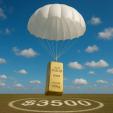Gold pulls back as market digests US strikes on Iran, Strait of Hormuz risks linger
LONDON (June 23) Gold (XAU/USD) is trading in a tight range on Monday after the United States (US) carried out coordinated strikes on Iran’s nuclear infrastructure over the weekend.
US President Donald Trump confirmed that American forces bombed three of Iran’s key nuclear facilities – Fordow, Natanz and Isfahan on Saturday night.
In a televised address from the White House Briefing Room, Trump described the mission as “a very successful attack,” warning that “there are many other targets” if Iran does not seek peace.
At the time of writing, Gold is trading below $3,400 in the European session. Traders remain focused on developments in Tehran and the status of global Oil supply routes, particularly the Strait of Hormuz.
Geopolitical risks surge, boosting Gold’s safe-haven flows
The US coordinated strikes on Iran, dubbed Operation Midnight Hammer, involved B-2 Spirit bombers and Tomahawk missiles from US submarines. Iranian Foreign Minister Abbas Araghchi called the attacks “a heinous crime” in a state broadcast interview, warning of “everlasting consequences.” His remarks were later confirmed and quoted by Reuters on Sunday.
Iran’s parliament approved a motion to close the Strait of Hormuz — an Oil transit chokepoint for nearly 20% of global supply. The final decision now lies with the Supreme National Security Council. Oil prices spiked in response, adding to inflation risks and supporting safe-haven flows into Gold.
Gold daily digest market movers: Strait of Hormuz, inflation at risk
- Speaking during an emergency session of the United Nations (UN) Security Council on Sunday, China’s Ambassador to the UN, Fu Cong, criticized the US strikes on Iran’s nuclear sites as “a serious breach of sovereignty”, and warned of “potential consequences for regional stability.” He urged both the US and its allies to show restraint and emphasized that “force cannot resolve the issue.” His remarks were reported by Reuters and Chinese state media, which echoed Beijing’s call for diplomatic solutions and non-interference in Iran’s domestic affairs.
- Israeli Prime Minister Benjamin Netanyahu labeled the strikes “historic,” while UN Secretary-General António Guterres described them as a “dangerous escalation,” urging restraint. These comments were published across Reuters and major international outlets on Sunday.
- The mission to destroy Iran’s nuclear program was described by Trump as a “spectacular military success,” claiming Iran’s enrichment infrastructure was “completely and totally obliterated.”
- Iranian lawmaker and Revolutionary Guards commander Esmail Kosari told Press TV that parliament had “come to the conclusion we should close the Strait of Hormuz.” Kosari added that “the final decision is the responsibility of the Supreme National Security Council” and will be enacted “whenever necessary.” His remarks were echoed in a separate interview with the Young Journalist Club and widely reported by Reuters. The Strait remains critical for global energy flows, handling nearly 20% of daily Oil exports.
- Geopolitical tensions bolster Gold’s safe-haven appeal. The threat of retaliation from Iran and potential energy disruptions have fueled investor demand for Gold, even as prices consolidate below the $3,400 level. Uncertainty surrounding the security of maritime routes and the broader Middle East outlook continues to support risk-off positioning.
- The possibility of a prolonged conflict and a spike in energy prices has renewed concern over inflation risks, particularly if the Strait closure materializes. Rising Oil prices could pressure input costs and delay central bank rate-cut plans globally, especially in the US.
- Federal Reserve (Fed) Chair Jerome Powell is scheduled to deliver his semi-annual monetary policy testimony to Congress on Tuesday and Wednesday. Markets are watching for any indication that the Fed is shifting away from its “higher-for-longer” stance, although officials have stressed the need for more concrete disinflation before easing policy.
- Global equities are trading mixed, with US stock index futures little changed in the European morning. Traders remain on edge amid limited visibility on Iran’s next move and ahead of key macroeconomic commentary from both the Federal Reserve (Fed) and the European Central Bank (ECB) this week.
FXStreet










